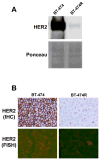Loss of HER2 amplification following trastuzumab-based neoadjuvant systemic therapy and survival outcomes
- PMID: 19920100
- PMCID: PMC2788123
- DOI: 10.1158/1078-0432.CCR-09-1735
Loss of HER2 amplification following trastuzumab-based neoadjuvant systemic therapy and survival outcomes
Abstract
Purpose: To evaluate HER2 status in residual tumor identified at the time of surgery in patients not achieving a pathologic complete response (pCR) and to determine the effect of alterations in HER2 status on recurrence-free survival (RFS).
Experimental design: Clinicopathologic data for patients with HER2-overexpressing breast cancer receiving neoadjuvant therapy with a taxane, anthracycline, and concomitant trastuzumab between 2004 and 2007 were reviewed. Surgical specimens for patients achieving less than a pCR were assessed to determine if there was enough residual tissue to evaluate posttreatment HER2 status. RFS was determined using the Kaplan-Meier method and compared by the log-rank statistic.
Results: A pCR was achieved in 72 of the 142 (50.7%) patients. Residual tumor was sufficient to assess posttreatment HER2 status in 25 patients. Fluorescence in situ hybridization done on pretreatment specimens confirmed HER2 amplification before beginning therapy. Eight (32.0%) posttreatment tumors were found to be HER2-negative by fluorescence in situ hybridization. At a median follow-up of 37 months (range, 8-56 months), the RFS was significantly better for patients with tumors that retained HER2 amplification (87.5% versus 50%, P = 0.04).
Conclusion: High pCR rates are achieved in patients with HER2-positive breast cancer treated with neoadjuvant trastuzumab in combination with anthracyclines and taxanes. One third of patients with significant residual disease loses HER2 amplification, and this change is associated with poor RFS. Residual tumor identified at the time of surgery should be reassessed for HER2 status, and novel adjuvant therapy strategies need to be studied in this population.
Figures



References
-
- Slamon DJ, Godolphin W, Jones LA, et al. Studies of the HER-2/neu proto-oncogene in human breast and ovarian cancer. Science. 1989;244:707–12. - PubMed
-
- Paik S, Hazan R, Fisher ER, et al. Pathologic findings from the National Surgical Adjuvant Breast and Bowel Project: prognostic significance of erbB-2 protein overexpression in primary breast cancer. J Clin Oncol. 1990;8:103–12. - PubMed
-
- Press MF, Bernstein L, Thomas PA, et al. HER-2/neu gene amplification characterized by fluorescence in situ hybridization: poor prognosis in node-negative breast carcinomas. J Clin Oncol. 1997;15:2894–904. - PubMed
-
- Slamon DJ, Clark GM, Wong SG, et al. Human breast cancer: correlation of relapse and survival with amplification of the HER-2/neu oncogene. Science. 1987;235:177–82. - PubMed
-
- Cobleigh MA, Vogel CL, Tripathy D, et al. Multinational study of the efficacy and safety of humanized anti-HER2 monoclonal antibody in women who have HER2-overexpressing metastatic breast cancer that has progressed after chemotherapy for metastatic disease. J Clin Oncol. 1999;17:2639–48. - PubMed
Publication types
MeSH terms
Substances
Grants and funding
LinkOut - more resources
Full Text Sources
Other Literature Sources
Medical
Research Materials
Miscellaneous

